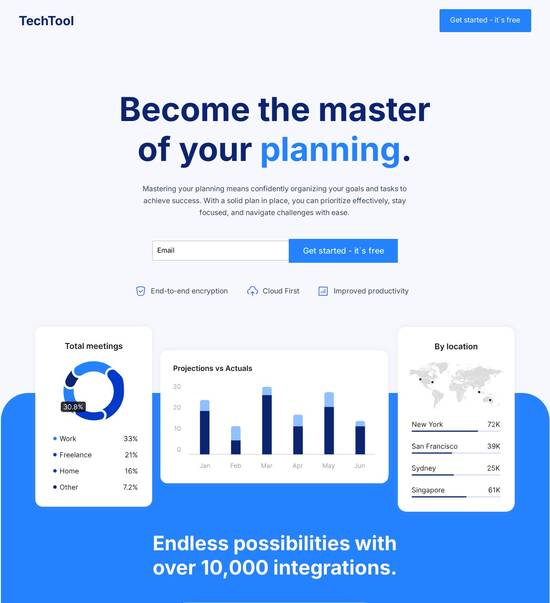
Blog page template for Contract specialists
Explore Similar TemplatesAbout template
Master your online marketing with this builder for blog page template for Contract specialists. Try more tools to create an immaculate landing page.
Recommended templates

Easy to build without coding
With the intuitive drag-and-drop builder, anyone on your team can create high-converting pages without any knowledge of code or design. Make enhancements to your landing page with custom widgets using Javascript, HTML/CSS, or third-party scripts.

Multiple layouts for any industry and goal
Select from 500+ landing page layouts built to boost conversions across industry-specific scenarios. Customize them by adjusting fonts, adding images, and generating on-brand content with the AI assistant. Quickly scale with Instablocks® and Global Blocks that you can save, reuse, and update globally.

Loads fast and looks polished on any device
Every template is responsive, which means they present professionally on any device and load blazingly fast with our Thor Render Engine. You can also power them up with Google AMP technology to deliver an unparalleled mobile experience and drive higher conversions.

Robust analytics & experimentation
Get real-time updates and reporting across all your devices, showing the number of visitors, conversions, cost-per-visitor, and cost-per-lead. Launch AI-powered experiments, run A/B tests, and use heatmaps to analyze user behavior, then optimize your landing page to maximize conversions.







Easy to build without coding
With the intuitive drag-and-drop builder, anyone on your team can create high-converting pages without any knowledge of code or design. Make enhancements to your landing page with custom widgets using Javascript, HTML/CSS, or third-party scripts.
Multiple layouts for any industry and goal
Select from 500+ landing page layouts built to boost conversions across industry-specific scenarios. Customize them by adjusting fonts, adding images, and generating on-brand content with the AI assistant. Quickly scale with Instablocks® and Global Blocks that you can save, reuse, and update globally.
Loads fast and looks polished on any device
Every template is responsive, which means they present professionally on any device and load blazingly fast with our Thor Render Engine.
Robust analytics & experimentation
Get real-time updates and reporting across all your devices, showing the number of visitors, conversions, cost-per-visitor, and cost-per-lead. Launch AI-powered experiments, run A/B tests, and use heatmaps to analyze user behavior, then optimize your landing page to maximize conversions.
All the features you need to build lead-generating landing pages
Explore more featuresLearn how to build top-performing landing pages for any goal
FAQs
Leading the way in building high-performing landing pages





A step-by-step guide to using Instapage for optimizing landing pages
Optimizing your marketing campaigns begins with effective landing pages, and Instapage provides a robust platform to enhance your conversion rate optimization (CRO) efforts. With a plethora of tools designed specifically for marketers in sectors like business services, tech/SaaS, and financial services, you can easily create, personalize, and optimize landing pages tailored to your audience.
Understanding the basics of landing page optimization
Landing page optimization is critical to maximizing your ROI in digital marketing. Instapage empowers marketers with its easy-to-use interface, allowing for rapid deployment of landing pages that drive measurable results. Here’s a breakdown of the essential steps you need to follow.
- Choose a template: Instapage offers over 100 pre-designed templates that suit different industries and marketing goals, which can drastically reduce setup time.
- Utilize lead generation elements: Implement forms, buttons, and calls-to-action strategically positioned to convert visitors into leads.
- Track performance: Use the built-in analytics dashboard to monitor page performance metrics and optimize based on real-time data.
Step 1: Analyze your target audience
Understanding who your audience is, directly influences how you tailor your landing pages. Review demographic data, preferences, and behaviors to create content that resonates. For example, if your target audience includes education sector professionals, highlight benefits relevant to their specific challenges.
Step 2: Design and build with Instapage's tools
Using Instapage’s drag-and-drop builder makes designing landing pages intuitive. Focus on creating visually appealing pages that incorporate your brand elements.
- Incorporate high-quality images: Visuals should align with your messaging and appeal to your target metrics.
- Use Instablocks for reusability: Save your tailored sections to use across multiple pages, maintaining consistency and efficiency.
- Add dynamic text replacement: Personalize your content dynamically based on the visitor’s source to increase relevance.
Step 3: Test and optimize
Conduct A/B testing to refine your landing pages. Instapage's experimentation features enable you to iterate easily and find which elements yield the highest conversion rates.
- Test various headlines: Minor changes can lead to significant improvements in click-through rates.
- Experiment with different layouts: Analyze which configurations best lead to conversions.
- Adjust call-to-action placements: Identify the most effective locations for buttons and forms.
In conclusion, leveraging Instapage for landing page optimization will streamline your marketing efforts and significantly improve your campaign outcomes.
Start using Instapage today to transform your landing pages and achieve the ultimate conversion rates your marketing campaigns deserve!
Blog page template for contract specialists
Understanding the landscape of contractual obligations in the digital age
The swift pace of globalization and technology has reshaped the way businesses interact, putting a spotlight on the significance of service agreements in business transactions. These documents establish the foundational expectations between parties and ensure that all parties know their obligations. Service agreements are vital for delineating responsibilities, timelines, and compensation, thus reducing risks and misunderstandings.
In the world of contract specialists, utilizing templates is a strategic approach that can streamline the drafting process. Templates not only save precious time but also promote compliance with various legal standards. By having a standardized framework, contract specialists can focus on the nuances of agreements without getting bogged down in repetitive drafting.
The role of a blog page template for contract specialists
A blog page template specifically designed for contract specialists serves as an organized platform for sharing insights, updates, and resources pertinent to service agreements. These templates can include predefined sections, such as legal updates, best practices, and case studies that give contract professionals valuable information at a glance. With these dedicated templates, professionals can engage their audience effectively, ensuring that each piece of content is relevant and tailored for their niche.
Having a dedicated blog page template also enhances brand recognition and authority for legal professionals. It facilitates sharing of tailored content that strengthens their expertise in service agreements, thereby attracting a more focused audience looking for specialized knowledge.
The need for clarity: what is a service agreement template?
Definition and purpose of a service agreement template
A service agreement template is a pre-formatted document that outlines the specific terms of a service to be provided. It typically includes critical elements such as descriptions of the services, expectations, timelines, payment terms, and dispute resolution processes. By using a template, parties can ensure that all important aspects are covered without having to start from scratch each time they draft a contract.
The benefits of using a standardized template for service agreements include increased efficiency, reduced misunderstandings, and a higher level of compliance with legal requirements. Customizing a template can also help maintain consistency across different service agreements, making it easier for contract specialists to manage and enforce terms consistently.
Key features of a service agreement template
Customizable fields for the parties involved, allowing for quick adaptations.
Dedicated sections for specific terms, the nature of service, and duration to avoid ambiguity.
Clear and concise language designed to minimize legal ambiguities and ensure mutual understanding.
An in-depth look at a service contract agreement template
Understanding the difference between a service contract and a service agreement is essential for contract specialists. While both documents outline terms between parties, a service contract typically encompasses more detail surrounding the execution of specific services. It addresses the legalities that govern the contract, such as liability, compliance, and remedies for breach of contract.
Service contract agreements are crafted with meticulous legal language to protect the interests of all parties involved. For example, including indemnity clauses and confidentiality requirements ensures that proprietary information remains secure. A well-structured service contract agreement clearly delineates each party's obligations, which promotes trust and transparency in professional relationships.
Examples of well-structured service contract agreements often feature an introduction, definitions, and specific sections that address performance metrics, milestones, and payment structures. Incorporating these elements provides clarity for all parties and serves as a point of reference should disputes arise.
Navigating through essential document templates
Service agreement templates: a detailed breakdown
Service agreement templates can vary significantly depending on the industry and services rendered. For instance, an agreement template for a tech company may emphasize software licensing and data security, while one for a marketing firm could focus on deliverables and timelines. Recognizing these differences allows contract specialists to select and customize templates that meet their specific needs.
Including keywords relevant to the specific service offered is crucial. Keywords not only improve the searchability of agreements but also ensure that the contract meets industry standards and regulations. For example, terms such as ‘data breach,’ ‘intellectual property,’ and ‘service level agreements’ are essential as they define expectations and can impact legal liability.
The working agreement template: bridging gaps
A working agreement serves as a supplemental tool that enhances collaboration among parties involved in a project. It explicitly outlines the expectations and responsibilities of each party, which helps prevent miscommunication. By clarifying objectives, timelines, and deliverables, working agreements function as a bridge between the initial service agreement and the practical application of the project.
These templates are beneficial in multi-party projects where the roles may overlap. Establishing a clear understanding through this medium enhances project outcomes and fosters positive professional relationships. When all parties are aligned on objectives, the chances of conflict decrease significantly.
Tailoring templates to meet unique business needs
Customizing templates to reflect specific business interests can greatly enhance the effectiveness of service agreements. Contract specialists should assess the unique aspects of their operations and incorporate relevant provisions that address these factors. This customized approach ensures that the agreement not only serves legal purposes but also aligns with the strategic goals of the business.
When aligning service agreement templates with company policies, it is crucial to review internal guidelines and operational practices. This may involve adjusting terms to reflect organizational culture, compliance requirements, and industry standards. Utilizing feedback from various stakeholders can inform revisions and foster better overall agreement execution.
Utilizing filter keywords for effective contract drafting
Utilizing the right keywords during contract drafting is vital for clarity and alignment with industry standards. Filter keywords ensure that the essential aspects of a service agreement are highlighted, allowing both legal and non-legal stakeholders to understand the core provisions quickly. The right terminology can make a significant difference in how contracts are interpreted and enforced.
To find industry-specific keywords, contract specialists should engage in thorough research. This can include reviewing similar contracts, legal publications, and industry regulations. Collaborating with colleagues to compile a list of essential keywords aids in increasing searchability and relevance, ultimately improving the integrity of contracts.
Techniques and tricks for crafting flawless agreements
Common mistakes to avoid when using templates
One of the frequent pitfalls that contract specialists encounter is failing to fully customize templates. While templates offer a time-saving advantage, using them without modification may lead to misunderstandings or missed obligations. It is essential to ensure that templates are adapted to reflect the specific terms and conditions pertinent to each agreement.
Another mistake is neglecting the inclusion of all necessary clauses. Every service agreement should incorporate crucial elements like termination conditions, liability limits, and amendment procedures to facilitate effective enforcement. Contract specialists should meticulously review each template to affirm that all significant provisions are included.
Best practices for utilizing templates efficiently
To mitigate common mistakes, contract specialists should develop a checklist of essential elements to verify before finalizing documents. Key components to include are parties’ information, scope of services, confidentiality clauses, and payment terms. This strategy encourages thoroughness and minimizes the chance of errors.
Additionally, leveraging collaborative tools fosters an environment of teamwork when drafting and reviewing agreements. Utilizing platforms that allow for real-time edits and feedback can dramatically speed up the production process while ensuring accuracy.
The intersection of technology and contract creation
The advent of digital tools has transformed contract creation processes for specialists. Software solutions designed for contract management streamline activities such as drafting, reviewing, and storing agreements, significantly enhancing efficiency. With features such as automated reminders and document histories, contract specialists can ensure compliance and manage changes effectively.
Moreover, technology facilitates better communication among stakeholders. Online collaboration tools allow parties to negotiate and finalize terms seamlessly. The ability to track changes and gain insights into document performance enables contract specialists to refine their agreements continually, ensuring they remain relevant and effective.
The importance of monitoring and updating service agreements
As business needs evolve, so too should service agreements. Regular reviews and updates of these documents are essential to address changes in the business landscape, regulations, or service delivery methods. Contract specialists should set periodic evaluations to ensure that agreements remain aligned with current organizational objectives and legal requirements.
Tools that assist in tracking modifications over time play a pivotal role in maintaining relevance. A contract management system can provide notifications for upcoming expirations or notify users of necessary updates, ensuring timely adjustments are made. This proactive approach ultimately promotes successful contract execution and management.
Engaging the business world with effective document management
Effective document management systems are indispensable for contract specialists aiming to maintain comprehensive records. Organizing service agreements into categories or tagging them with relevant keywords ensures quick retrieval and reference when needed. Such systems not only save time but also reduce the likelihood of misplacing important documents.
Moreover, robust document management strategies enable contract specialists to maintain compliance with regulatory requirements. They provide a clear audit trail and the ability to access historical agreements, which is vital for accountability and legal protection.
Final thought: the evolution of service agreements in modern business practices
Reflecting on how effective templates and technological advancements are shaping the future of contract management reveals a clear trajectory towards increased efficiency and accuracy. As contract specialists continue to adopt agile methodologies in contract creation, the business landscape will inevitably shift towards more streamlined and integrated approaches.
In conclusion, the potential for innovative contract management practices can revolutionize the way businesses operate, ultimately creating a model where agile contract creation becomes the norm. In this evolving environment, templates will play a crucial role in ensuring that businesses can respond swiftly to new challenges while maintaining legal compliance.
Ready to skyrocket conversions?
Supercharge your ad campaigns with high-performing landing pages
Get started














